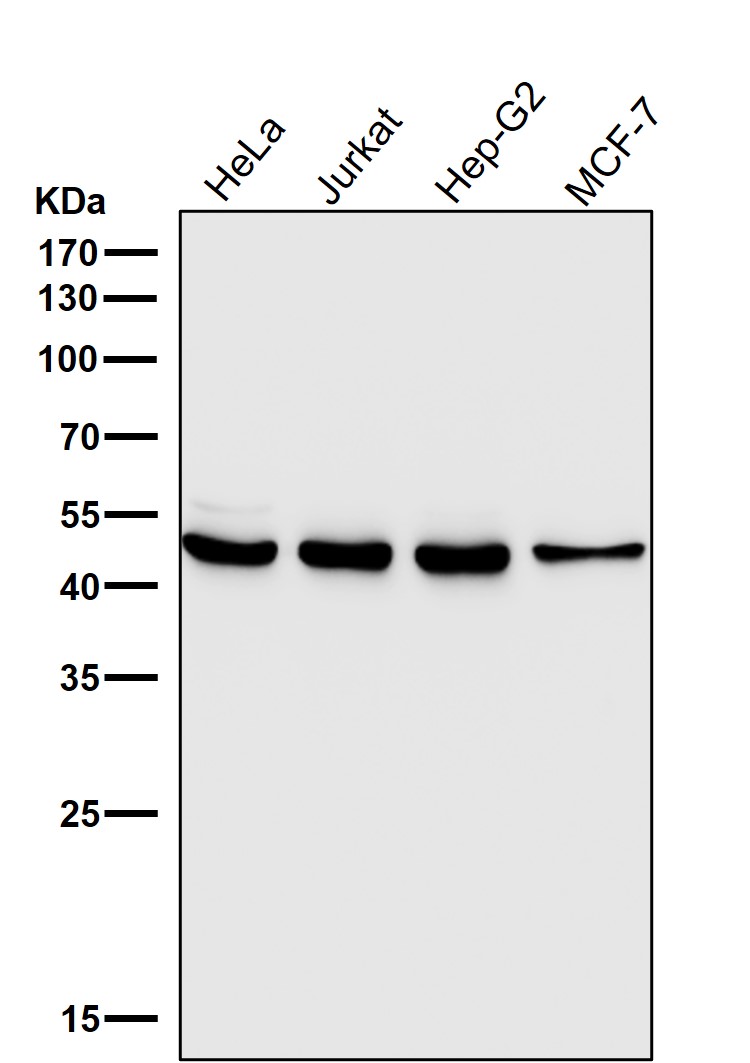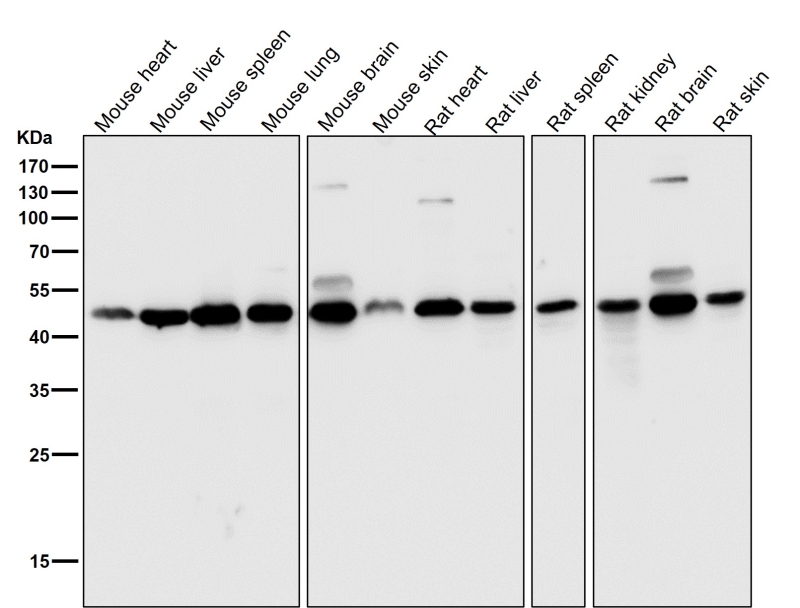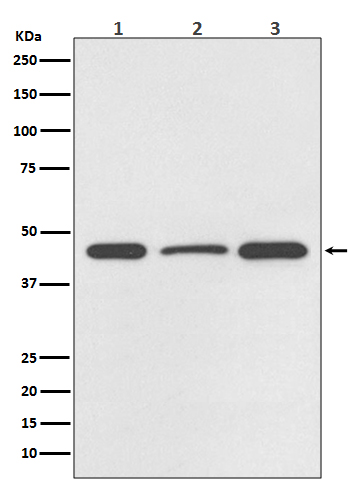


| WB | 咨询技术 | Human,Mouse,Rat |
| IF | 1/20-1/50 | Human,Mouse,Rat |
| IHC | IHC:1/100-1/200;IHF:1/50-1/200 | Human,Mouse,Rat |
| ICC | 1/50-1/200 | Human,Mouse,Rat |
| FCM | 1/20-1/100 | Human,Mouse,Rat |
| Elisa | 咨询技术 | Human,Mouse,Rat |
| Aliases | HVH1; MKP1; CL100; MKP-1; PTPN10; DUSP1;;DUSP1 |
| WB Predicted band size | Calculated MW: 39 kDa ; Observed MW: 40 kDa |
| Host/Isotype | Rabbit IgG |
| Antibody Type | Primary antibody |
| Storage | Store at 4°C short term. Aliquot and store at -20°C long term. Avoid freeze/thaw cycles. |
| Species Reactivity | Human,Mouse,Rat |
| Immunogen | A synthesized peptide derived from human DUSP1 |
| Formulation | Purified antibody in PBS with 0.05% sodium azide,0.05% BSA and 50% glycerol. |
+ +
以下是关于DUSP1抗体的3篇参考文献,简要整理如下:
---
1. **文献名称**:*DUSP1/MKP-1 regulates phosphorylation and stability of p53 to control DNA damage responses*
**作者**:Li, J., et al.
**摘要**:该研究利用DUSP1抗体(Western blot和免疫沉淀法)揭示DUSP1通过去磷酸化p53调控其稳定性,从而影响DNA损伤应答。实验表明,DUSP1缺失会导致p53过度激活,加剧细胞凋亡。
2. **文献名称**:*Role of DUSP1 in modulating inflammatory responses in sepsis*
**作者**:Hammer, M., et al.
**摘要**:通过免疫组化和小鼠模型,作者发现脓毒症中DUSP1表达显著升高(使用特异性DUSP1抗体检测),其通过抑制MAPK通路减轻炎症损伤,提示DUSP1为潜在治疗靶点。
3. **文献名称**:*Tissue-specific regulation of DUSP1 by glucocorticoids in chronic stress*
**作者**:Wang, Y., et al.
**摘要**:研究采用DUSP1抗体分析不同组织(脑、肝、免疫细胞)中的蛋白表达,发现糖皮质激素通过激活DUSP1抑制JNK/p38信号,阐明其在慢性应激中的组织特异性调控机制。
---
以上文献均涉及DUSP1抗体的实验应用(如Western blot、免疫组化),聚焦于其在DNA修复、炎症调控及应激反应中的功能机制。如需更多文献或具体期刊信息,可进一步补充关键词(如疾病模型、技术方法)进行筛选。
DUSP1 (Dual Specificity Phosphatase 1), also known as MAPK phosphatase 1 (MKP-1), is a member of the dual-specificity phosphatase family that negatively regulates mitogen-activated protein kinase (MAPK) signaling pathways by dephosphorylating and inactivating MAPKs, including ERK, JNK, and p38. This enzyme plays a critical role in controlling cellular responses to stress, inflammation, and growth signals, making it a key modulator of immune function, apoptosis, and cell proliferation. Dysregulation of DUSP1 has been implicated in various diseases, including cancer, autoimmune disorders, and neurodegenerative conditions.
DUSP1 antibodies are essential tools for studying its expression, localization, and functional interactions in biological systems. They are widely used in techniques like Western blotting, immunohistochemistry (IHC), and immunofluorescence (IF) to quantify protein levels in tissues or cultured cells under different experimental conditions. Researchers also employ these antibodies to explore DUSP1's role in feedback mechanisms that limit excessive MAPK activation, as well as its interplay with signaling pathways influenced by glucocorticoids or oxidative stress. Commercially available antibodies are typically validated for specificity using knockout controls or siRNA-mediated silencing. However, variations in isoform expression or post-translational modifications may affect detection accuracy, necessitating careful experimental optimization. Studies using DUSP1 antibodies have contributed to understanding its dual role as both a tumor suppressor and promoter, depending on cellular context and disease stage.
×